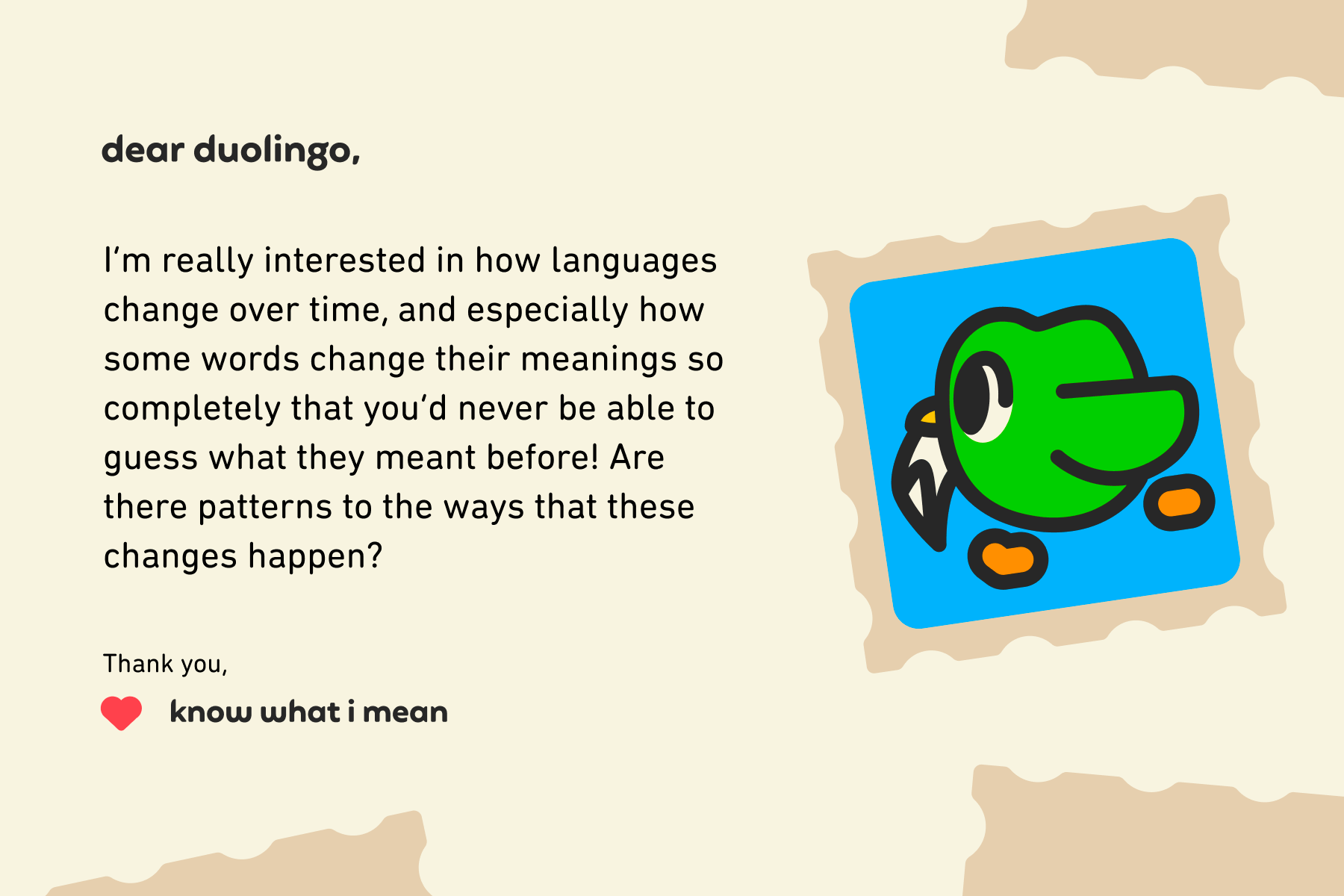Welcome to another week of Dear Duolingo, an advice column just for learners. Catch up on past installments here.
Hi again, fellow language learners! You have such amazing questions about language change, and I’m delighted to answer this one about how words can gain—and lose—their meanings over the centuries. Let’s take a look!
Our question this week:

What a great question! And you’re onto something—while language change is constant and largely unpredictable, there are absolutely some patterns we see over time and across languages.
Here are some of the most common ways that words change their meaning!
Learn the history of:
- eavesdropper
- arena
- mouse
- clue
- arrive
- bird
- meat
- hound
- dial
- hang up
- insult
- soon
- decimate
- will
- sinister
- villain
- prestigious
- knight
Change to refer to something nearby
This first type of change is called metonymy, which comes from a Greek word meaning roughly “a change of name.” It’s when a word takes on the meaning of something else that’s nearby or closely associated with it.
Word: eavesdropper
What it used to mean: water that fell from the roof (or eaves) of a house
What happened: This word’s meaning actually went through more than one change in the 500 or so years that it’s been in use! First, it referred to the water itself that fell from a house’s roof, then to the ground that the water landed on, and finally to its current meaning—from the idea of a person taking cover under the eaves of a house to surreptitiously listen to what’s happening inside!
Word: arena
What it used to mean: sand
What happened: The word arena comes from the Latin word for sand, which was one component of ancient Roman arenas—it was used to cover the central surface of an arena floor where combat took place. (If you speak Spanish, you know that the Spanish word arena still means sand!)
From concrete to abstract
This type of change is called metaphor, and it comes from a Greek word meaning carry over. You probably know plenty of metaphors used in literature (Shakespeare’s “All the world’s a stage” is a famous one), but this literary device can also transform a word’s meaning permanently!
Word: mouse
What it used to mean: a cute little rodent 🐭 (or a pest, if they’re in your house uninvited)
What happened: You may have already made the connection between the little whiskered animal and the computer device! Even though we still use the original meaning of mouse, this word gained an extra meaning in the late 20th century as computers became more common, due to the computer accessory that it (somewhat) resembles.
Word: clue
What it used to mean: ball of yarn
What happened: If you think back to the last time you had to find your way out of a cave or labyrinth (no? just me?), then you might see how the word clue went from meaning “a ball of yarn” to meaning any piece of information or evidence that can help you figure out a tricky situation—a figurative ball of yarn leading you to the right answer!
From specific to more general
Sometimes, a word’s meaning “widens” to include more things than it used to! This is called generalization.
Word: arrive
What it used to mean: to reach the shore via water
What happened: Today, the English verb arrive (and the French verb arriver that it came from) can refer to getting anywhere by any mode of transport, rather than just arriving to the shore after a journey over the water. The connection to its former meaning is a little more obvious in French, though: Compare arriver to the word rive, meaning riverbank!
Word: bird
What it used to mean: a recently-hatched bird or fledgling
What happened: The word bird was originally brid in Old English (this is a common sound change!), and it used to refer only to young birds before it generalized to mean an avian of any age. 🐣
From general to more specific
The opposite of generalization, this is when a word’s meaning narrows or shrinks to include fewer things than before. It’s called specialization.
Word: meat
What it used to mean: food of any kind
What happened: Meat used to refer to food in general, not just the edible part of an animal. You might recognize the similarity between meat in English and mat, the word for food in Swedish and Norwegian, or mad, the word in Danish!
Word: hound
What it used to mean: a dog of any breed
What happened: Hound used to refer to all dogs before it became specific to certain breeds of hunting dogs. Again, if you know any other Germanic languages, you might notice that this change didn’t happen everywhere: Hond in Dutch and Afrikaans, Hund in German, and hund in Swedish, Norwegian, and Danish all still mean dog.
Changes in technology
Sometimes, a term takes on new meanings to adapt to our changing world, and people may or may not be aware of its origin!
Word: dial
What it used to mean: to turn or rotate something
What happened: The word dial (as in dial a phone number) originally referred to something that turned, such as the shadow of a sundial, the needle of a compass, the hands of a clock, or the dial on a rotary phone. Even though rotary phones gave way to keypads and eventually to touchscreens, the verb dial stuck around—long after we stopped using rotating parts to enter a phone number!
Word: hang up
What it used to mean: to suspend above the ground
What happened: Similar to dial, the verb hang up used to have a literal meaning: It comes from the days when we used to actually suspend the telephone receiver to end a call. Now, most of us just tap a red circle on our screen.

Meanings become less intense
This type of change, called hyperbole (whose pronunciation may surprise you if you’ve never heard it before: hyperbole), is when a word is used in exaggerated contexts frequently enough that it actually begins to mean a “lighter” version of its former definition!
Word: insult
What it used to mean: to jump on
What happened: English got this word from French around the 16th century, which got it from Latin insultare, literally on + to jump! It’s kind of like the boy who cried wolf: If your dramatic friend complains enough times that his sworn enemy “jumped on him” when all they really did was say something mean, you’re eventually going to understand that jump on doesn’t mean he was physically attacked. You can still see traces of the Latin verb saltare in several Romance languages: saltar in Spanish, saltare in Italian, sauter in French, and sări in Romanian all mean jump!
Word: soon
What it used to mean: immediately
What happened: We all know someone who’s chronically late (or maybe that person is you… 🫣), so you’ll probably have no trouble imagining how the word soon went from meaning “immediately” to “at some point in the near future.”
Meanings become more intense
The opposite of hyperbole, this type of change (called meiosis) is when a word’s meaning becomes stronger.
Word: decimate
What it used to mean: to reduce by one-tenth
What happened: English borrowed this word from Latin decimātus, and you can see the relationship between this word and the English word decimal! The first record of decimate in English dates back to the 17th century, and it only took a few decades (another word where we see the dec‑ prefix for ten!) before its new meaning (“to drastically reduce or destroy”) had caught on.
Word: will
What it used to mean: to want to
What happened: Imagine being certain enough that things will go your way that saying something like I want to get an A essentially means I will get an A! This is an oversimplification of how the word will came to mean something far more definite than simply want, but that’s the general idea. (In German, by the way, the word will hasn’t changed meaning: Ich will means I want!)
A word’s meaning gets worse
This process is called pejoration, and it’s when a word gains a more negative connotation over time.
Word: sinister
What it used to mean: left
What happened: The left side is taboo in many cultures, and this meaning change is an example of centuries-old negative attitudes surrounding the left hand and the left side of the body in general. The word sinister originally comes from Latin, and the present-day Italian word sinistra means both left and sinister!
Word: villain
What it used to mean: a peasant or farmhand
What happened: Villain used to refer to one of the lowest classes of laborers in feudal Europe (and also to the fact that they were residents of a villa!). People who belonged to this class were sometimes the target of negative stereotypes based solely on their societal role—for example, the idea that they were particularly prone to evil behavior, just like our present-day definition of villain!
A word’s meaning gets better
This last process—called amelioration—is the opposite of pejoration: A word’s meaning becomes more positive!
Word: prestigious
What it used to mean: something done by deceit or illusion (like a magic trick)
What happened: Compared to many of the examples we’ve cited, the shift in meaning of prestigious is much more recent: It only gained its current, positive meaning around the early 20th century—maybe from the idea that using trickery or deceit is necessary for improving your reputation?
Word: knight
What it used to mean: boy or servant
What happened: Knight evolved from the Old English word cniht (that’s right, it wasn’t spelled any closer to how we pronounce it back then, either!) when it changed from meaning boy or servant to a boy or young man who served a king, often as a soldier. It was from this meaning that it became an official military rank, and now it can mean an honorary title awarded without any military service at all!
Change doesn’t happen overnight
Before words change meaning completely, there’s often a period of time (possibly lasting centuries!) when they have both meanings, so you can actually see language change in action. Are there any you’ve noticed that seem to be currently taking place in your language? How do your predictions line up with our predictions for the future of English, Spanish, French, and German?
For more answers to your language and learning questions, get in touch with us by emailing dearduolingo@duolingo.com.
